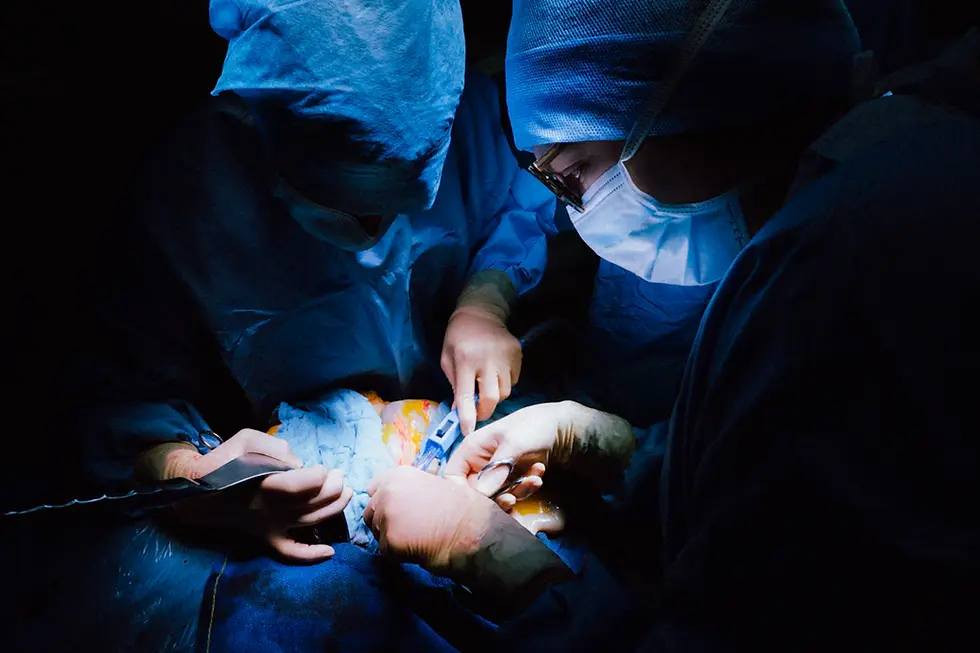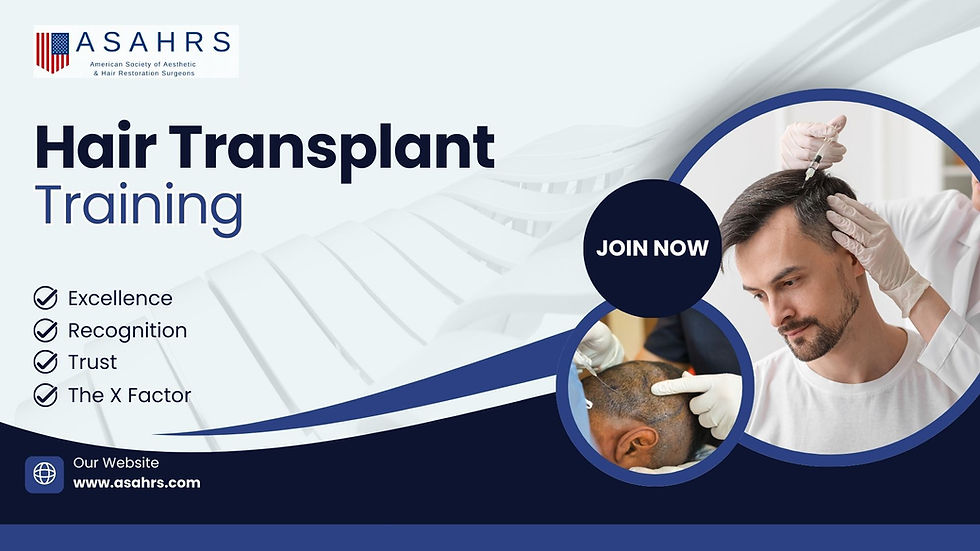Mastering Post-Operative Care: Essential Practices for Medical Staff
- Tech Blogger
- Aug 12, 2025
- 5 min read

Post-operative care is a critical aspect of healthcare that ensures optimal recovery for patients, particularly in specialized fields like hair transplant procedures. As the demand for aesthetic enhancements increases, the need for well-trained medical staff becomes essential. This article delves into the best practices for post-operative care, especially for specialists in hair transplant training for doctors and nurses, highlighting the importance of continued education through hair transplant courses, hair transplant fellowship opportunities, and hair transplant certification.
The Importance of Post-Operative Care
Post-operative care involves monitoring and supporting patients as they recover from surgery. For procedures like hair transplants, where patients undergo a delicate surgical process, exceptional post-operative care is vital. This stage ensures that patients follow recovery guidelines, manage pain, and prevent complications, ultimately leading to successful outcomes and patient satisfaction.
Why Proper Training Matters
Medical staff with comprehensive knowledge about post-operative care significantly enhance patient recovery experiences. Undertaking hair transplant training equips doctors and nurses with the necessary skills to manage specific concerns related to hair transplant procedures. Engaging in continual professional development through certifications and fellowships not only refines clinical skills but also promotes best practices across the board.
Key Components of Post-Operative Care
Effective post-operative care can be broken down into several core components. Understanding these elements helps medical staff provide thorough support during the critical recovery period.
Monitoring Vital Signs: Pay close attention to the patient’s vital signs such as heart rate, blood pressure, and oxygen saturation. Regular monitoring helps identify any potential complications early, such as infection or adverse reactions.
Pain Management: Administer appropriate pain relief medications and educate patients on managing discomfort. The goal is to keep patients as comfortable as possible during their recovery.
Wound Care: In hair transplant procedures, proper care around the donor and recipient sites is crucial. Staff should provide clear instructions on how patients should care for these areas to promote healing.
Post-Operative Instructions: Ensure that patients understand the dos and don’ts of recovery, including direction on activity restrictions, hygiene, and medication adherence.
Follow-Up Appointments: Schedule regular follow-up visits to monitor healing and address any concerns. This reinforces the importance of care and builds trust with the patient.
Training and Certification in Post-Operative Care
For those involved in hair transplant procedures, specialized training is essential. Hair transplant training for doctors and nurses provides the foundation required for effective patient care. Courses often cover surgery techniques, post-operative management, and potential complications.
To further enhance their expertise, medical personnel can pursue a hair transplant fellowship, which offers comprehensive education and hands-on experience in advanced techniques and patient management strategies. This fellowship not only boosts confidence but also elevates the overall standard of care in clinical practices.
Best Practices in Post-Operative Care
Implementing best practices in post-operative care is essential for achieving optimal patient outcomes. Below are the recommended best practices that medical staff should follow:
CLEAR COMMUNICATION
Effective communication is the cornerstone of quality healthcare. Ensure that medical staff clearly communicate with patients regarding their post-operative care instructions. This includes:
Verbally explaining care instructions and answering any questions.
Providing written materials that detail care procedures and contact numbers for questions related to their recovery.
Personalized Care Plans
Each patient is unique, which is why personalized care plans are essential. Develop a post-operative care plan tailored to the individual’s specific needs, considering factors such as:
Type of hair transplant procedure performed
Patient’s medical history and any underlying conditions
Potential allergies to medications
Patient Education
Patients often feel anxious after surgery. Providing thorough education helps ease their concerns and fosters a better recovery experience. Topics to cover include:
Pain management strategies
Signs of complications that require immediate medical attention
Expected recovery timeline and follow-up care
Addressing Post-Operative Challenges
Despite taking all precautions, challenges may arise during post-operative care. Being prepared to handle these situations is vital. Some common challenges include:
Pain Management Issues
Some patients may experience more pain than anticipated. As a medical professional, assess their pain accurately and tweak pain management strategies as needed to enhance comfort.
Infection Risks
Infection is a serious concern post-surgery. Educate patients on signs of infection, such as redness, swelling, and discharge from surgical sites, and ensure they know to seek immediate assistance if these occur.
Emotional Support
Emotional well-being is just as important as physical well-being. Offer support and compassion to patients during their recovery journey. Encourage them to express their feelings and concerns.
The Role of Continuing Education
The medical field is ever-evolving, making continuing education crucial for healthcare providers. Engaging in hair transplant training, pursuing hair transplant certification, and enrolling in hair transplant courses keeps medical staff up-to-date on the latest procedures and best practices, ultimately improving patient care.
Investing in a hair transplant fellowship offers greater insight into advanced techniques and post-operative management. These continuous educational opportunities not only enhance individual skills but also refine the quality of care offered in clinics.
Nurturing a Team Approach
Post-operative care functions best when a team approach is adopted. Collaboration among medical staff, including surgeons, nurses, and administrative personnel, ensures that all aspects of patient care are managed effectively.
Encouraging open dialogue within the medical team promotes seamless communication and shared responsibilities.
Regular team meetings can facilitate sharing best practices, discussing challenges, and strategizing effective care approaches.
Wrapping It Up: Elevating Patient Care Through Excellence
Post-operative care is a dynamic and crucial aspect of the medical field, significantly impacting patients’ recovery journeys, particularly after hair transplant procedures. By embracing best practices, enhancing training through specialized courses, and fostering a collaborative team environment, medical staff can elevate the care they provide. Doctors and nurses equipped with advanced knowledge not only help patients achieve their aesthetic goals but also ensure safety and satisfaction throughout their recovery process.
As medical professionals, it is essential to continue honing skills, embracing new challenges, and committing to lifelong learning. By doing so, we not only improve individual practices but also contribute to a culture of excellence in healthcare.
FAQs
What is the importance of post-operative care?
Post-operative care is crucial as it helps monitor and support patients during their recovery from surgery, ensuring they follow recovery guidelines, manage pain, and prevent complications.
Why is proper training important for medical staff in post-operative care?
Proper training equips medical staff with the necessary skills to effectively manage recovery experiences and specific concerns related to procedures like hair transplants.
What are the key components of post-operative care?
Key components include monitoring vital signs, pain management, wound care, providing post-operative instructions, and scheduling follow-up appointments.
How can medical staff enhance their expertise in post-operative care?
Staff can enhance their expertise through specialized hair transplant training, pursuing hair transplant fellowships, and obtaining certifications.
What challenges might arise in post-operative care and how should they be addressed?
Challenges include pain management issues, risks of infection, and the need for emotional support; these can be addressed through accurate assessments, patient education, and providing compassionate care.
.png)



Comments